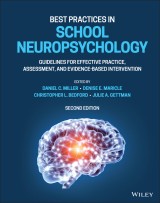Details

Best Practices in School Neuropsychology
Guidelines for Effective Practice, Assessment, and Evidence-Based Intervention2. Aufl.
|
104,99 € |
|
| Verlag: | Wiley |
| Format: | EPUB |
| Veröffentl.: | 24.03.2022 |
| ISBN/EAN: | 9781119790556 |
| Sprache: | englisch |
| Anzahl Seiten: | 640 |
DRM-geschütztes eBook, Sie benötigen z.B. Adobe Digital Editions und eine Adobe ID zum Lesen.
Beschreibungen
<b>The latest edition of the gold standard in school neuropsychology references</b> <p>In the newly revised Second Edition of <i>Best Practices in School Neuropsychology: Guidelines for Effective Practice, Assessment, and Evidence-Based Intervention,</i> a team of psychological experts delivers a thoroughly updated treatment of modern issues and challenges in school neuropsychology. The editors provide comprehensive discussions of current assessment and intervention models, best practices in assessing cognitive processes, and the important task of collaborating with parents, educators, and other professionals. <p>This latest edition includes: <ul> <li>Explorations of the unique challenges posed by working with culturally diverse student populations</li> <li>Clinical advice for learning specialists and neuropsychologists engaged with special populations and students with academic disabilities, processing deficits, or medical disorders</li> <li>New chapters on assessment and intervention with children suffering from trauma or substance abuse</li> </ul> <p>Perfect for psychologists, neuropsychologists, clinicians, and academics working in or studying school environments, <i>Best Practices in School Neuropsychology</i> is a must-read reference for practitioners working with children and students who seek a one-stop reference for evidence-informed assessment and intervention guidelines.
<i>Foreward </i><br /><i>About the Editors </i><br /><i>List of Contributors </i><br /><br /><b>Section l: Professional Issues in School Neuropsychology</b><br />1. School Neuropsychology Specialization<br />2. School Neuropsychology Training and Credentialing<br />3. Ethical and Legal Issues Related to School Neuropsychology<br />4. Multicultural School Neuropsychology<br /><br /><b>Section ll: Practice Issues in School Neuropsychology</b><br />5. Theories in School Neuropsychology <br />6. Integrating Cognitive Assessment in School Neuropsychological Evaluations<br />7. The Application of Neuroscience to the Practice of School Neuropsychology<br />8. School Neuropsychology Collaboration with Home, School, and Outside Professionals<br />9. "Return to Learn": School Reentry for Children Recovering from Neurological Conditions<br />10. Statistical and Clinical Interpretation Guidelines for School Neuropsychological Conditions<br />11. Importance of Assessing Effort and Motivation<br /><br /><b>Section lll: Clinical Applications of School Neuropsychology: Clinical Disorders</b><br />12. Assessing and Intervening with Children with ADD/ADHD<br />13. Assessing and Intervening with Children with Autism Spectrum Disorders<br />14. Assessing and Intervening with Children with Developmental Delays<br />15. Assessing and Intervening with Children with Emotional Disorders<br />16. Assessing and Intervening with Children who are Deaf or Hard of Hearing <br />17. Assessing and Intervening with Visually Imparied Children<br />18. Assessing and Interveninig with Children who are Chronically Ill <br />19. Assessing and Intervening with Children with Brain Tumors<br />20. Assessing and Intervening with Children with Seizure Disorders <br />21. Assessing and Intervening with Children with Traumatic Brain Injury<br />22. Assessing and Intervening with Children who have been Traumatized <br />23. Assessing and Intervening with Children and Adolescents- Substance Use and Abuse <br /><br /><b>Section IV: Clinical Applications of School Neuropsychology: Academic Disabilities </b><br />24. Assessing and Intervening with Children with Reading Disorders <br />25. Assessing and Intervening with Children with Written Language Disorders<br />26. Assessing and Intervening with Children with Mathematics Disorders<br />27. Assessing and Intervening with Children with Auditory Processing and Speech Language Disorders<br />28. Assessing and Intervening with Children with Nonverbal Learning Disabilities <br /><br /><b>Section V: Clinical Application of School Neuropsychology: Functional/Processing Deficits </b><br />29. Assessing and Intervening with Children with Sensory-Motor Impairment <br />30. Assessing and Intervening with Children with Memory Disorders <br />31. Assessing and Intervening with Children with Executive Function Disorders <br />32. Assessing and Intervening with Children with Processing Speed Deficits<br /><br /><i>Author Index </i><br /><i>Index </i><br /> <br /><br /><br />
<p><b>Daniel C. Miller, PhD,</b> is the Executive Director of the Woodcock Institute for the Advancement of Neurocognitive Research and Applied Practice at Texas Woman’s University. He is also the Director of the School Neuropsychology Post-Graduate Certification Program of the School Neuropsychology Institute. </p> <p><b> Denise E. Maricle, PhD,</b> is a Professor in the School of Social Work, Department of Psychology and Philosophy at Texas Woman’s University in Denton, Texas. <p><b> Christopher L. Bedford, PhD,</b> is the Executive Director of the American Board of School Neuropsychology and an Associate Director at the School Neuropsychology Institute. He is also a licensed psychologist and maintains a private practice in St. Paul, Minnesota. <p><b>Julie A. Gettman, PhD,</b> is Associate Director of the School Neuropsychology Institute and a licensed school psychologist. She is also the owner of Mindworks Assessment, a private practice specializing in neurocognitive assessment and intervention in children and adolescents.
<p><b>An accurate and up-to-date discussion of practice and procedure in school neuropsychology </b></p> <p>In the newly revised second edition of <i>Best Practices in School Neuropsychology: Guidelines for Effective Practice, Assessment, and Evidence-Based Intervention</i>, a team of distinguished psychology practitioners and educators delivers a robust and authoritative discussion of the most relevant issues and challenges that arise in modern school neuropsychology. The book explores current assessment and intervention models and best practices in assessing cognitive processes. It also examines the critical task of collaborating with parents, educators, and other professionals. <p><i>Best Practices in School Neuropsychology</i> explores: <ul><li>The distinctive challenges posed by assessing and treating children in culturally diverse student populations.</li> <li>Clinical advice for learning specialists and psychologists engaged in work with special populations and students with academic disabilities, processing deficits, or medical disorders.</li> <li>Brand-new content covering trauma, substance abuse, ADHD, exposure to toxins, processing speed, and assessment of effort.</li></ul> <p><i> Best Practices in School Neuropsychology: Guidelines for Effective Practice, Assessment, and Evidence-Based Intervention</i> is a must-read reference for psychologists, neuropsychologists, clinicians, and academics who specialize in treatment of school-age populations. It’s also an ideal one-stop resource for practitioners working with children and students who seek evidence-informed assessment and intervention guidelines.
-
-
© 2024 media control GmbH
Alle Preise enthalten die gesetzliche Mehrwertsteuer. - AGB
- Impressum
- Datenschutzerklärung
- Kontakt
- FAQ
- Mein Konto
- Home
- Erweiterte Suche
- Widerrufsrecht
- Reader-Software
- Desktop-Ansicht
- Gutschein-Code einlösen
- English


